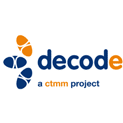NL-Funded Project

Abbreviation:
DeCoDe
Title:
Decrease Colorectal cancer Death.
In short:
Development and validation of sensitive and non-invasive tests for colorectal cancer.
Tags:
Diagnostics, Innovation


Project Details
Funding scheme:
Center for Translational Molecular Medicine (CTMM) – Grant ID 03O-101
Time frame:
1 September 2008 – 31 August 2013
Description:
There is a global consensus among experts that early detection of colorectal cancer (CRC) is the most promising strategy to decrease death rates and the socio-economic burden related to this disease. Colonoscopy was regarded as the best technique for detecting CRC and its precursor lesions and is recognized as the gold standard at the time of the project. Within the framework of CRC screening, it has been shown that colonoscopic evaluation at the population level is worthwhile from the age of 50 years onwards. However, the burdening diagnostic procedure (bowel preparation), health risks (bleeding and bowel perforation) and capacity problems prevent reaching a high participation level of population colonoscopy screening. The objective of the DeCoDe was therefore to develop and validate sensitive and specific non-invasive tests for population screening, which are easy to apply and well tolerated. In particular, DeCoDe aimed to optimize DNA isolation from stool and blood, identify biomarkers and translate these biomarkers into the diagnostic test. GenomeScan contributed to two work packages: identifying biomarkers for 1) predicting response to radiotherapy and 2) predicting risk of recurrence of rectal cancer.
Output:
Copy number alterations and allelic ratio in relation to recurrence of rectal cancer. Goossens-Beumer IJ, et al. BMC genomics. 2015 Dec;16(1):438. doi: 10.1186/s12864-015-1550-0
Acknowledgements:
This study was performed within the framework of CTMM, the Center for Translational Molecular Medicine. DeCoDe project (grant 03O-101).

